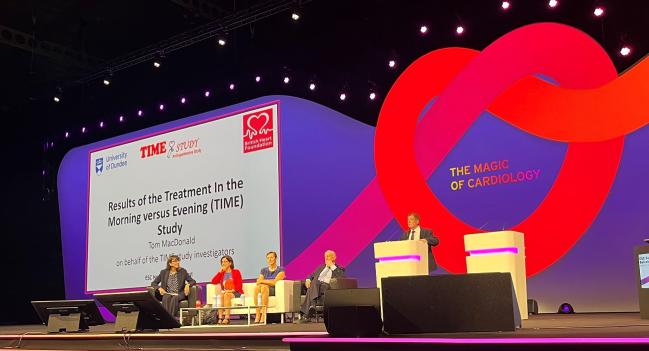TIME of Antihypertensive Dose Doesn’t Matter for CV Protection
With no difference between nighttime and morning dosing, “patients can take their tablets whenever it’s convenient.”

BARCELONA, Spain—Contrary to some prior research, nighttime dosing of antihypertensive medications does not protect against major cardiovascular events compared with taking them in the morning, according to the large TIME trial.
Through a median follow-up of 5.2 years, the rate of MI, stroke, or vascular death was 3.4% and 3.7% with evening and morning dosing, respectively (HR 0.95; 95% CI 0.83-1.10), with similar findings across subgroups, Thomas MacDonald, MD (University of Dundee, Scotland), reported here at the European Society of Cardiology Congress 2022.
Moreover, there were no differences in safety—in terms of outcomes like falls or fractures—based on when patients took their medications.
At press conference, MacDonald said it’s reassuring that doctors can tell their patients to decide what’s more convenient for them without forgoing a potential benefit with nighttime dosing. They “can take their blood pressure medication either in the morning or the evening, as the timing makes no difference to cardiovascular outcomes,” he noted.
The results run counter to some prior research that has suggested that taking blood pressure-lowering medications at night might be better. Nighttime BP more closely predicts adverse cardiovascular outcomes compared with daytime readings, and patients with high pressures at night are treated more aggressively, MacDonald said.
It’s been thought, then, that getting the peak effect of antihypertensive therapy in the evening might lower risk, and there are randomized data to support that idea. The randomized MAPEC trial, for instance, demonstrated better BP control and a lower risk of CVD death, MI, ischemic stroke, or hemorrhagic stroke when patients took their antihypertensives at bedtime. The same research group later demonstrated similar findings in the much larger Hygia Chronotherapy Trial, which enrolled more than 19,000 patients.
[Patients] can take their blood pressure medication either in the morning or the evening, as the timing makes no difference to cardiovascular outcomes. Thomas MacDonald
In TIME, the investigators randomized 21,104 patients (mean age 65 years; 58% men) who were being treated with at least one antihypertensive for high BP within the UK National Health Service to either morning or nighttime dosing of their usual drug regimens. The study was decentralized, meaning all screening, consent, randomization, and follow-up were done online and by email.
At baseline, mean BP was 135/79 mm Hg based on home measurement. MacDonald noted that that would translate into higher office readings.
Over follow-up lasting as long as 9.3 years, there was no difference in the primary endpoint of MI, stroke, or vascular death—all independently adjudicated—or in any of the individual components of that composite endpoint.
The investigators found some variation in BP values depending on when they were measured and the timing of dosing. When BP was measured in the morning, mean systolic pressure was slightly higher with morning dosing, and when it was measured in the evening, mean systolic BP was slightly higher with nighttime dosing.
MacDonald said the differences in BP were not that great, however, and it shows that the medications are not working for the full day.
“I think that . . . maybe we should have tablets that can really work for 24 hours,” he said. “That may be a good thing for blood pressure.”
Rhian Touyz, MBBCh, PhD (McGill University Health Centre, Montreal, Canada), who was the discussant following MacDonald’s presentation, told TCTMD that TIME answers a pertinent question considering the growing understanding of the importance of fluctuations in BP throughout the day.
As for why the results differ from those of the previous randomized trials, she said it could be related to the lack of standardization of drug regimens in TIME, the relatively low baseline BP of the trial population, or the lack of consideration of special circumstances like nocturnal hypertension.
Therefore, these findings apply to the types of patients included in the trial but not necessarily groups with higher levels of risk, such as those with resistant hypertension or more-severe CV risk, Touyz said. “Until we get some new data looking at the more intermediate-to-higher-risk patients, whether nighttime dosing really does have benefits still I think needs to be proven further.”
But, she said, “for the garden-variety patient with fairly controlled hypertension, it probably doesn’t make much difference if medication is taken during the day or the evening.”
Steen Dalby Kristensen, MD, DMSc (Aarhus University Hospital, Denmark), who moderated the press conference, said the findings are convincing. The next step will be to communicate them to the wider medical community, he added. “There were some alterations in the blood pressure that actually could be found for morning and for evening dosing, but it didn’t really seem to matter because the hard endpoints from this study showed that there was no difference. So I think that’s reassuring.”
Todd Neale is the Associate News Editor for TCTMD and a Senior Medical Journalist. He got his start in journalism at …
Read Full BioSources
MacDonald TM. TIME – the Treatment in Morning versus Evening study. Presented at: ESC 2022. August 26, 2022. Barcelona, Spain.
Disclosures
- TIME was funded by the British Heart Foundation and supported by the British and Irish Hypertension Society and the National Institute for Health and Care Research in the UK.
- MacDonald reports receiving research contracts from Novartis and (previously) Menarini and consulting for AstraZeneca and Novartis.
- Touyz reports no relevant conflicts of interest.


Comments